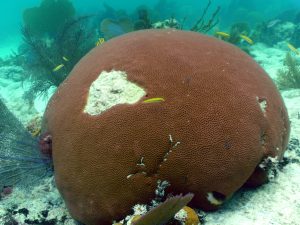
When it comes to the health of coral reefs, the story seemed simple at first: ocean warming and acidification negatively impacts environmental conditions needed for coral reefs to grow and maintain the vibrant ecosystem around them. However, researchers at the University of North Carolina at Chapel Hill and Northeastern University now reveal a much more complex and nuanced picture: Moderate increases in ocean acidification and warming surprisingly appears to benefit corals, while extreme changes harm them.
“There seems to be a tipping point for how these corals respond to these two stressors, and this peak-shaped response to ocean acidification is something that we have not seen before,” said Karl Castillo, an assistant professor of marine sciences in UNC’s College of Arts and Sciences. “A few people suspected that to be the case, but this is the first time it has been shown, primarily because we used ocean pH spanning more than 300 years.”
The work, published in this month’s issue of the journal Proceedings of the Royal Society B: Biological Sciences, brings to light not only an interesting scenario for how climate change impacts ocean chemistry and affects coral reefs, but also shows that warming is a more immediate threat than acidification, paving at least one path forward for how to protect the coral reefs and the coastal communities that depends on them for food and commerce.

Castillo, born in Belize, and his team began their work in June 2011, when they collected samples of the massive starlet coral (Siderastrea siderea) off the coast of Belize from the Mesoamerican Barrier Reef System, the second largest barrier reef ecosystem in the world and the largest in the Western Hemisphere. They transported them to the Aquarium Research Center, a marine lab in the Marine Sciences Department at UNC-Chapel Hill, and exposed them to different temperatures and acidities to examine the impact of these two stressors.
They took a longer, more historical view by exposing the corals to pre-Industrial Revolution, present-day and future conditions for both warming and acidity based on projections from the Intergovernmental Panel on Climate Change.
In addition to finding a tipping point, they also found that ocean warming is negatively influencing coral growth at a faster rate than acidification — work that has immediate implications for governmental policy makers and reef managers that protect corals, which among other things, provide a home for thousands of marine species and offer natural protection from storm surges and support tourism.
“We found that the warming projected for the end of the 21st century caused a greater decline in coral growth than the acidity projected for the same interval,” Castillo said. “Perhaps reef managers should focus their protection efforts on the reefs that are experiencing the greatest warming, rather than the greatest acidification.”
Often referred to as “the other carbon dioxide problem,” acidification is a distinct issue from ocean warming but one that stems, in large part, from the same source — carbon dioxide emissions — according to Castillo. Scientists estimate that the oceans have absorbed up to 50 percent of the carbon dioxide emitted by humans over the past 200 years, resulting in chemical changes in the oceans that reduce the availability of minerals needed by corals and many marine organisms, such as oysters, to build shells and skeletons.
Study co-author Justin Ries is an associate professor of marine sciences at Northeastern University. The other authors are John Bruno, a UNC professor of biology, and Isaac Westfield, a research scientist at Northeastern.
The scientists, accompanied by graduate and undergraduate students from UNC and Northeastern, will collect additional corals from the region next summer to examine whether other coral species exhibit the same responses to higher acidity levels and warming.
The research was supported by the Carolina Postdoctoral Fellowship for Faculty Diversity, Seeding Postdoctoral Innovators in Research and Education, the National Oceanic and Atmospheric Administration and the National Science Foundation.
The study is dedicated to Jack Weiss, a UNC professor from the curriculum for the environment and ecology who contributed significantly to the research project and has since passed away.



